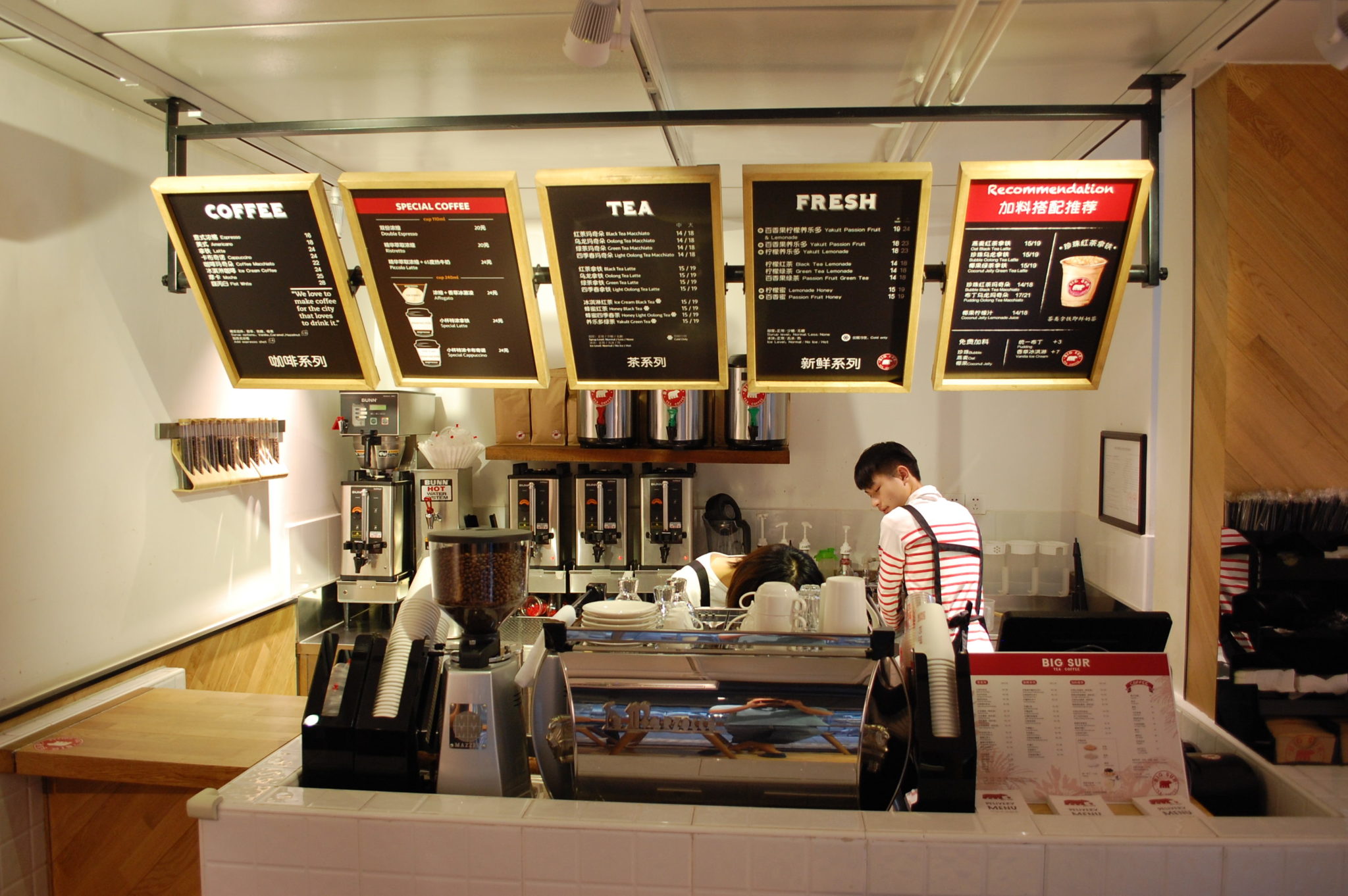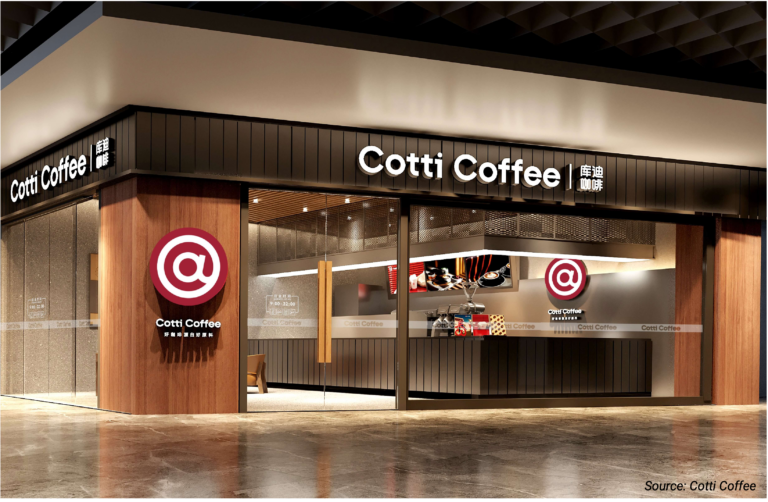How Carol Liu, the founder of Big Sur Tea and Coffee Shop, forged a new path in the coffee shop industry in China
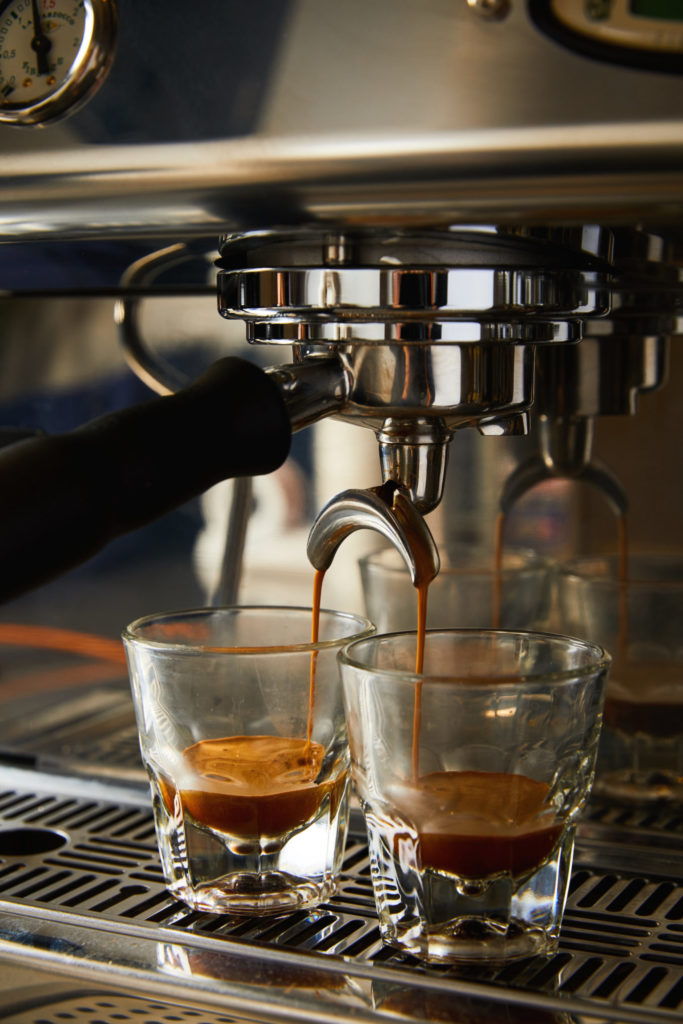
Carol Liu invested in one of the best coffee machines on the market, La Marzocco.
For Carol Liu (刘晓光), her story is a part of a growing crowd in Shanghai. Once China began encouraging budding entrepreneurs through the easing of legal requirements and the facilitation of capital raising, many small firms have cropped up in sectors ranging from finance and tech to retail and consumer services. The trend swept up Carol and inspired her to use her business talents for a personal venture. Always a drinker of coffee, Carol wanted to do something different than her corporate job, so she decided to enter the coffee shop industry in China.
Daxue Consulting has helped many entrepreneurs to optimize their China-facing strategies. In an effort to constantly improve our services, we met with Carol to glean some of her insights.
Her entrance into the industry was well-timed too, as according to Coffee International Organization, coffee consumption in China has been increasing 16% per year from 2004 to 2014. More recently, Euromonitor estimates that coffee consumption in China will increase by 18% per year from today until 2019. While this information may not have been available to Carol at the time, her instincts and passion were what drove her to start a new business. Within a few years, she and her husband pooled together the money, their experience, and their love of coffee to create a winning brand strategy.
There is a lot of fierce competition in the F&B, and specifically coffee shop industry in China: why did you choose this segment, and how did you come up with your coffee and tea shop business idea?
Carol Liu: “No industry has zero competition, but we choose F&B because we are passionate about it. I am native Chinese and have lived in Shanghai for many years. For me, [Shanghai] is the most familiar market. The idea originated from my addiction to drinking coffee, and I started to work on it around October 2015. In addition to coffee, we added a tea series because tea is a traditional beverage in China. The tea series is a good complement to the coffee.
What is your brand’s concept and why did you choose this concept?
Carol Liu: Our concept is pretty simple: a small shop, reasonable prices, and great quality, where people can either sit down or take their coffee to go. Employees of nearby business offices find us very convenient, whether in the morning before going into the office, at noon after lunch or during an afternoon break. Since we offer both tea and coffee, we are catering to the large segment that does not drink coffee after 2:00PM. Our ability to deliver this concept with high-quality goods definitely makes us unique.
What have you done to differentiate yourself from other tea and coffee shops? What are the challenges associated with being unique in the coffee shop industry in China?
Carol Liu: We do our best to keep our promise of healthy, fresh, high-quality products for our customers. The hardest part is the fluctuating prices of raw materials. With those changes, maintaining the same quality, retail price, and margins can be difficult.
With the coffee shop industry on the rise and developing in China, how is Big Sur faring right now?
Carol Liu: Revenue has been increasing by around 10-15% month over month. However, because of the rising costs of labor cost and raw materials here [in Shanghai], our profits are being cut into more.
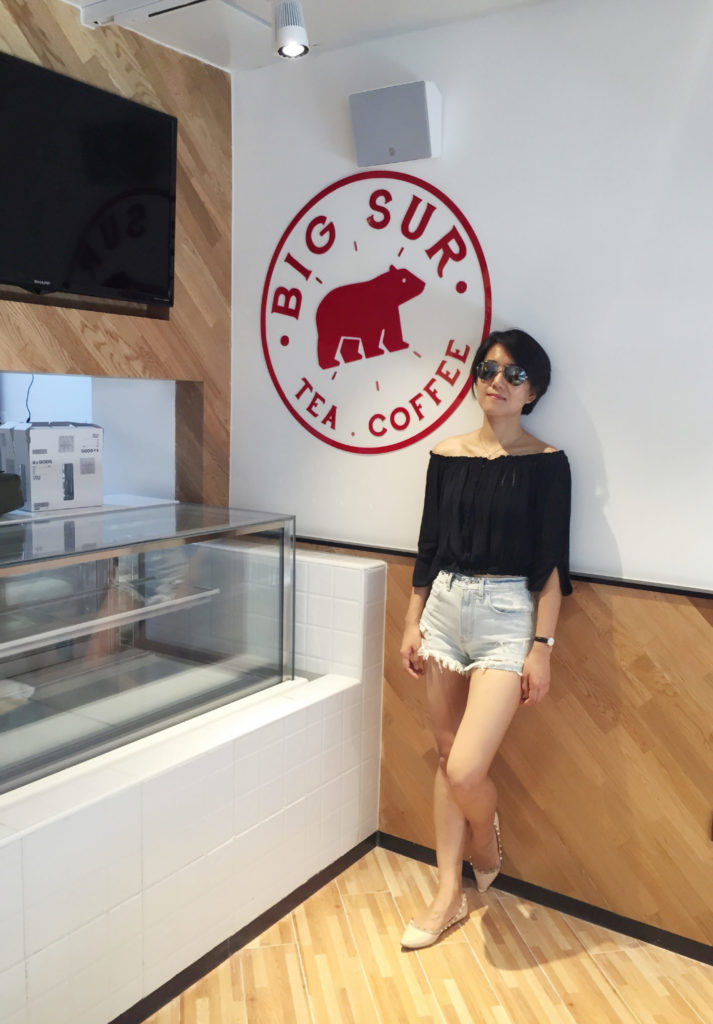
Within a few years, Carol Liu and her husband pooled together the money, their experience, and their love of coffee to create a winning brand strategy. Photo credit: Big Sur.
Can you tell us about your educational background and your career? Did any of your prior work experiences influence or inform you in this venture?
Carol Liu: I have bachelor’s degree and worked for around eight years in supply chain management. My experience in supply chain helps me to some extent, but in the end, it is the preparation, determination, and execution that resulted in Big Sur Tea and Coffee Shop (大苏尔咖啡与茶饮).
Why did you choose to join your husband in this adventure? Is it an advantage to have your husband as your business partner?
Carol Liu: It feels very natural. When opening up a new coffee shop, there are too many trivial things for just one person to do. We started out helping each other in small capacities, but our roles have since evolved. Working with your partner ensures complete trust for starters. But in the end, professionalism is just as important in operations.
How long did it take before your business took off? Have you experienced any business challenges?
Carol Liu: Around six months. The first difficulty was to find a qualified supplier in China for raw materials. Another is to find the best staff for our coffee shop. While the time it takes to reach profitability varies among our stores, it usually takes around three to 12 months.
What kind of marketing research did you do before the launch of Big Sur?
Carol Liu: Actually, we haven’t done systematical marketing research. Of course, we know some tea and coffee brands in Shanghai, and we often went to Starbucks before, but we never did do market research on coffee shops in China. To run Big Sur Tea and Coffee shop (WeChat: BigSur大苏尔), to go with this kind of business— mainly takeout—our drive comes purely from our interests and experiences. We truly believe these are the demands of the market and we can meet these needs, while simultaneously establishing our value.
Did you choose the venture capital route to finance Big Sur, or did you pursue other means?
Carol Liu: We did not use venture capital. Since both our shops are small [30 to 60 square meters, with around five chairs], we could afford the initial investment requirements. With venture capital, you can expand very quickly and you can promote employees accordingly. However, if you are not prepared for that kind of expansion and growth, you will quickly find that there is limited time to think about and solve problems. Without venture-backed support, we were forced to become more cautious, and our growth is more organic because of it.
Where did you find the funds for your project?
Carol Liu: The funds are from our own savings and other business ventures. Our total investments to date are over 1 million RMB (about $150,000). To run a new coffee brand, you have to prepare enough cash to support at least half a years-worth of operations, otherwise don’t do it.
What is some advice you could give other entrepreneurs about fundraising?
Carol Liu: Don’t distress if you struggle initially. At the very beginning of opening your first shop, it is hard to raise funds unless it’s from your relatives or friends. Once you’ve opened several shops, your operations, consumers, and market become more clear and established, then it canbe much easier to raise funds from larger organizations.
How much do you need to start a coffee shop business in China / Shanghai? Which parts cost more?
Carol Liu: Around RMB 500,000—1,000,000 (about $75,000 – 150,000) if the space is not very big. The related machines and rent cost the most.
Which brands of coffee and tea machine do you use? Why did you choose these specific brands?
Carol Liu: Each of our three shops has one coffee machine and one tea machine. For the tea, we use BUNN (邦恩), from the US. This tea machine ensures the best flavor for the tea. For the coffee, we use La Marzocco coffee machine (around 80,000 RMB each machine). In the industry, this brand is the best-balanced coffee machine in China in terms of flavor, stability and effectiveness. It is considered a standard for every good coffee shop.
What are the main risks for entering the coffee shop industry in China?
Carol Liu: Every business has risks. But as long as your products and services are good, with the right location, and with adequate time, you can keep a stable position in the market. Research on the location is very important.
Generally speaking, how did you find the best location for opening a coffee shop and how to did you assess its value? Do you have any advice?
Carol Liu: Different coffee brands have different strategies and different business models. For us, [in downtown Shanghai] nearby business offices are the key elements.
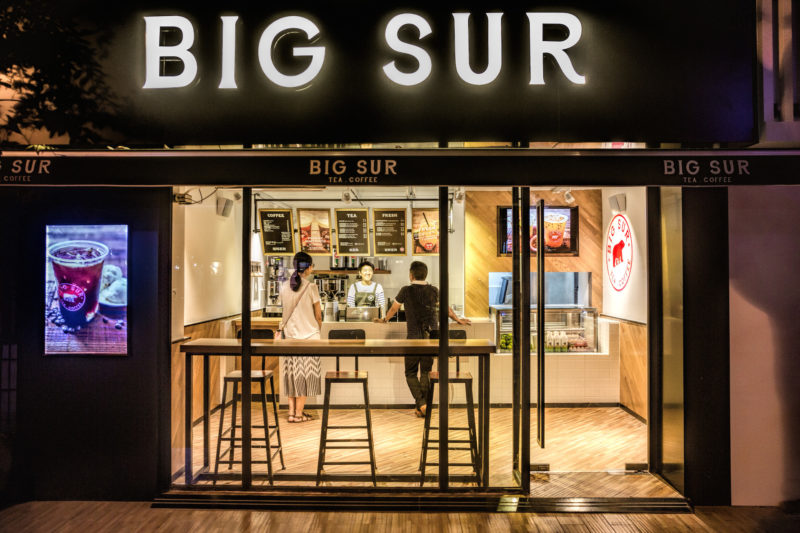
Located in a high-traffic area on Mengzi Road (蒙自路) in Huangpu district in Shanghai, this branch is Liu’s most profitable, especially in the mornings and after lunch. Photo credit: Big Sur.
Obviously, cost constraints are especially important for newer businesses. How have you managed to remain operationally efficient since opening?
Carol Liu: The key has been enhancing the capability and efficiency of our employees. Because most of our costs are fixed, like rent, raw materials, and utility expenditures, the biggest variable we can control for is the efficiency of our employees. Thus, we provide a series of training programs–on site training, mentor training systems, and outside training, all of which improve our employees’ ability and efficiency.
How often do you train your employees in the shop? And what kind of training do you provide to your staff?
Carol Liu: We have a workshop every month. But the most training comes from on the job experience. Our employees quickly learn a lot about the supply chain and business process. By emphasizing how we source, use, and present our products, we create a culture of passion about our products.
How do you build awareness and word-of-mouth? What promotional campaigns work best for you?
Carol Liu: We haven’t done much on our website or social media. We think the best marketing is our store. The location of our stores, their design, and our products are their own advertisements. These are the best tactics for attracting foot traffic and customer loyalty.
Who are your regular customers and how often do they come back? What do they like in your products?
Carol Liu: The relatively young white-collar workers who are willing to try new brands and aren’t loyal to bigger franchises like Starbucks. Most usually come in 3-4 times a week. They prefer the taste and the quality of our products.
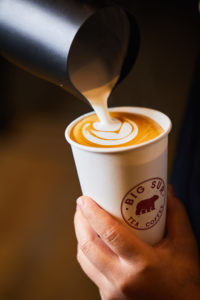
Finding qualified suppliers for raw materials was the first challenge faced by Carol Liu when launching her coffee shop chains Big Sur. Photo credit: Big Sur.
What is the best seller among your products and why do you think it is so successful?
Carol Liu: Out of our 30-40 products, coffee latte [sold at the price of 24 rmb] is the most popular, and again because of our prime location. A lot of the white collar workers that come in are used to having a coffee latte in the morning or after lunch.
Considering your various costs and customers’ price sensitivity, how do you price your products to maximize your profit?
Carol Liu: Everybody knows the prices of Starbucks Coffee, around 30 rmb for one cup. In a way, the price of Starbucks coffee acts as a standard average price for the coffee industry here. So then the question is, do we to price higher or lower than that? With our shops, we opt for the latter for a competitive advantage. We sell our coffee at an average price of 22rmb per cup, which is around 30% less than Starbucks.
Apart from responses on Dianping (大众点评),how else do you collect customer feedback and how do you response to those comments?
Carol Liu: We can collect some from our employees who work in the shop but not systematically. We also survey our customers on a variety of store attributes every month, such as cleanliness, service, and communication.
According to our research, your target consumers, the white collars, account for 63% of online food delivery app users. With which delivering apps did you choose to collaborate?
Carol Liu: We deliver our products through Meituan (美团) and Eleme (饿了么), with sales on Eleme [the leading player on the online food delivery market in China] being the most profitable. The commission is around 15%. Nevertheless, online sales are still a very small proportion of our profit so far, and represent only 10-15% of our revenue.
How much do online payments account for your total sales? Which online payment app has the largest share?
Carol Liu: Quite a significant amount. As for platforms, Alipay (支付宝) is the biggest, which represents over 50% of online sales.
What are your priorities for this year and in coming years?
Carol Liu: To open two more shops this year in downtown Shanghai, because our target customers are most dense in this area. Next year, we plan to shift to purchasing raw coffee beans directly from South America, as well as to start baking coffee by ourselves.”
In the Coffee industry and other practices, our clients share our passion for results and success. For more on our expert insights and our work in the coffee shop industry in China, please see our site, follow our newsletter, or reach out to us to learn more.


